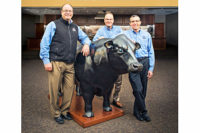Today’s ubiquitous food supply chain — at least in the developed world — has done away with the need to follow the herd for survival reasons. As a result, the phrase has become more of an analogy for companies that find a significant opportunity and set forth to exploit it to their advantage.
As consumer demand for all-natural beef has grown in West Coast metropolitan markets such as Seattle and San Francisco, Tyson Fresh Meats Inc. has discovered a proverbial “herd” it has begun to follow to great success. Though Tyson had been producing all-natural beef before, a unique set of factors aligned that has helped the company expand production of its natural product into the Pacific Northwest, where agricultural innovation and legacy cattle production support its growth and offer a true sustainability story.
Following the herd
Five years ago, Tyson Fresh Meats began offering a natural beef product line, at first under a line extension called Star Ranch Natural Angus® beef, explains Kent Harrison, vice president of marketing and premium programsfor Tyson Fresh Meats Inc.
“We realized as we developed a process and developed our supply chain, it was something that was specific enough and special enough, it needed its own identity,” he says. So, in 2009, Tyson Fresh Meats put its full branding power and marketing might behind the line, naming it Open Prairie Natural Angusbeef.
For the first two-and-a-half years after launching the brand, the Lexington, Neb., plant handled processing for the items. However, a combination of factors convinced the company it should expand its production of the brand's productsto its Pasco, Wash., facility, which it did in March 2012.
“It wasn’t a production-based decision,” says Harrison. “There was not only growing demand for the product — we needed to grow with consumer propensity to want natural products, as well as retailer propensity to have a section of the meat counter carrying natural product — but as important was the element of, ‘Where can we find the best naturally raised cattle?’ Producers that are growing natural cattle are in the Pacific Northwest.”
Greg Brandhorst, cattle buyer for Tyson Fresh Meats, says the venture was a brand new program and opportunity, created in the region with the local cattle producers. It was an opportunity to enhance the sustainability of the area for the producers who are here.
“These are second-, third-, fourth-generation ranchers. We just came off a fifth-generation ranch that was actually one of the first to put cattle into our program,” Brandhorst says. “The opportunity is created for them to enhance their product, yet keep their product in a local area, and Open Prairie Natural Angusbeef does that: Many of thecattle are fed 60 feet from the plant and most are actually born and raised 60 miles [or less] from the plant.”
In fact, Open Prairie Natural Angusbeef sources more than 80 percent of its cattle within a 30-mile radius of the plant, says Paul VanWassenhove, complex manager at Pasco.
Further bolstering the sustainability message put forth by the brand is the recent explosion in agricultural innovation throughout the Columbia River Basin, known internationally for its apple, cherry and potato crops. The basin, which drains into the Columbia and Snake rivers, offers farmers some of the most productive land in the world, and the climate allows for multiple crops and harvests each year.
“One of the opportunities here is the feed,” Brandhorst states. “[The climate] allows numerous crops to be grown, and one of the crops that has taken off in the last three years has been the corn crop — there have been fewer potatoes planted in Washington, Oregon and Idaho, and more corn acres over the last three years.
“That continues to increase, and as we all know, there's a satisfaction to grain-fed beef, which is what is being produced here,” he adds.
Settling in
Bringing Open Prairie Natural Angus beef production to Pasco required extensive planning and some training, but at the end of the day, the 1,300-plus employees of the plant were still processing beef, which they had been doing for decades. Training was required in the packaging areas for the new labels, boxes and packaging, but beyond that, the brand didn’t bring any cuts of meat that weren’t already being produced in Pasco under other brands.
“There was a learning curve, obviously, to get up to speed on having everything put in the natural bags and boxes,” Harrison says. “And that was a huge sacrifice for the plant, to take that on and somewhat take away efficiencies that we normally have, in order to take care of the natural brand.”
Furthermore, portions of the plant’s cold storage were revamped — some pallet slots were split into smaller slots, maximizing the ability to stock fewer units of certain items as the brand grew.
“It allowed us to do a 5-box order or a 100-box order instead of only being able to take a big number [of items on one pallet] into one lane,” says VanWassenhove. As far as handling natural beef on the same lines as product that is not all-natural, the facility processes Open Prairie Natural Angusbeef cattle first every day, followed by a solid break and a complete grade change before production on any other brand begins.
“Whether or not a consumer will know, it’s important to us that [those breaks are there,] so that when Pasco runs choice product after natural, there isn't any chance that there will be a crossover or a cross-pollination kind of issue,” Harrison says. Make no mistake: Tyson Fresh Meats takes the claims it makes about the brand very seriously, from properly selecting the sires for producing all-natural cattle, to prohibiting the use of animal byproducts as feed, and prohibiting hormones and antibiotics, on to the packaging, which is as sustainable as possible.
“We make sure that the corrugate of the boxes is part of the Sustainable Forest Initiative,” Harrison explains. “And when we do point-of-sale, we try to do it with vegetable-based inks as much as we can — really trying to live the integrity of the brand, tied back to the salt of the earth elements of our cattle producers.”
Exploring new frontiers
Creating a legacy around Open Prairie Natural Angusbeef is something Tyson Fresh Meats knows will take some time. The company expects demand for natural beef to continue to grow in popularity. As consumers look for beef that is antibiotic-free with no added hormones, and/or beef that has a sustainable story to tell, more foodservice operators and retailers will jump on board and want to carry these options for their customers.
From the Open Prairie Natural Angusbeef perspective, the pieces are in place for the brand to respond to demand, building upon its early, steady success, and starting with the herd itself.
“There’s room to grow [production of the brand] at Lexington, and anything headed east, our desire is for it to come out of Lexington,” explains Harrison, who expects processing of the brand to extend to more plants than the two it is in now — following the lead of other Tyson Fresh Meats premium programs. “There are pockets of natural producers, whether in Oklahoma, Missouri, Texas or elsewhere that we can source cattle and ship to one of our locations.”
However, Harrison stresses that the company isn’t ready to make such a move — mostly because the brand’s biggest opportunity at the moment remains in the Pacific Northwest.
“We’ve got tons of natural cattle here that we can harvest still,” he says. “We've got a sustainable source of supply here, and Tyson Fresh Meats does distribution really well.
“We know we want to keep it here as much as we can, but we also know that if we need to, we can get product across the country,” Harrison adds. “What’s next for Pasco is for us to continue to find markets for Pasco’s Open Prairie Natural Angusbeef, based on the story of the great cattle that are grown here in Washington, Oregon and California.”










